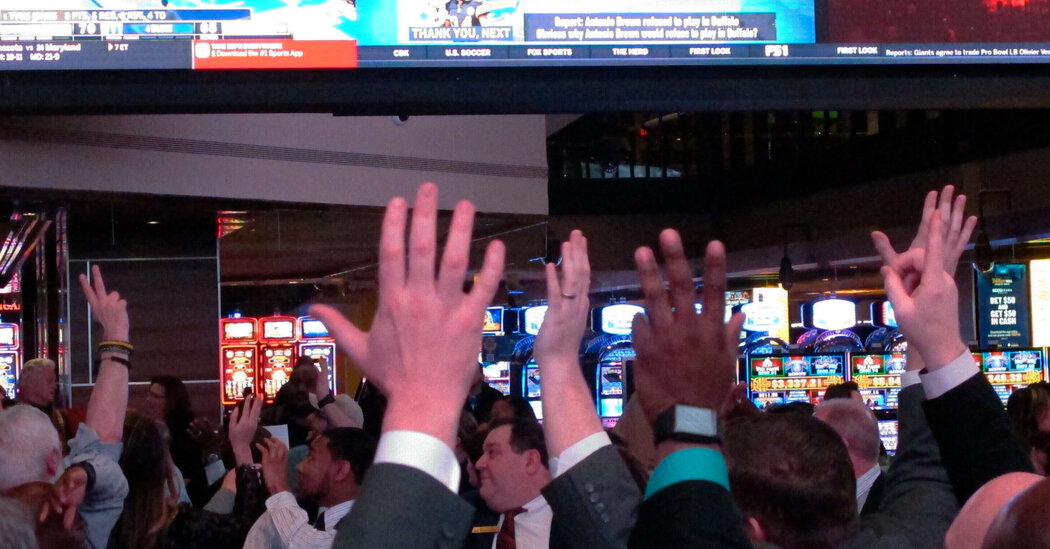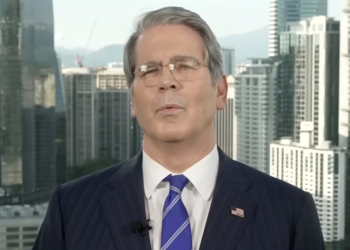On Thursday, the sports world faced one of its worst nightmares. The Justice Department announced the indictments of Chauncey Billups, the coach of the Portland Trail Blazers, and Terry Rozier, a guard for the Miami Heat, on gambling-related charges.
Billups — along with 30 other defendants — was charged for his involvement in a mafia scheme to rig illegal poker games in New York City and across the country. Rozier and five other defendants were charged with wire fraud and money laundering conspiracies related to a scheme in which Rozier allegedly changed his in-game behavior to rig so-called prop bets.
As the indictment defines it, a prop bet (short for proposition bet) is a bet “regarding the occurrence or nonoccurrence during a game of an event not directly affecting the game’s outcome.” A gambler can wager on whether a player will score over or under a certain number of points, for example, or whether a person will make or miss a certain number of three-point shots.
The indictment included a number of reported incidents of bet-rigging. In one of them, Rozier told a co-conspirator that he was going to remove himself from a game in the first quarter, almost certainly guaranteeing that a number of key statistics — including points scored — would be under the amount predicted.
While the Billups indictment wasn’t directly related to his conduct in N.B.A. games, the Rozier indictment claims that an N.B.A. coach — identified only as Co-Conspirator 8 — told one of the defendants that the Trail Blazers were “tanking” (that is, losing on purpose in the hope of getting a better draft pick), and that a number of key players would be sitting out an upcoming game, allowing gamblers — except now they were no longer gambling — to wager against the team. The biographical details (including the dates he played and the dates he coached) of Co-Conspirator 8 match up with Billups.
After Billups and Rozier were arrested, the N.B.A. placed both of them on immediate leave.
These indictments aren’t the only examples of deeply concerning behavior connected to sports betting. On Oct. 17, ESPN reported that “sportsbooks flagged dozens of suspicious bets made by gamblers repeatedly wagering against the same small-conference teams in at least 11 men’s college basketball games over six weeks last season.”
The bets may be related to an existing gambling investigation. The ESPN report said that “the games mentioned involve five of the six schools where the N.C.A.A. says 13 former players are under investigation for participating in gambling schemes.”
That’s not all. In July 2024, Jontay Porter, a former player for the Toronto Raptors, pleaded guilty to wire fraud conspiracy charges related to a scheme similar to the one that led to Rozier’s charges; in his case, Porter provided information that allowed bettors to confidently predict his in-game performance.
If you follow sports at all, you will have noticed that sports betting is everywhere. Ads for betting sites such as DraftKings and FanDuel blanket the airwaves. ESPN has even gotten in on the action, launching its own sportsbook, called ESPN Bet, and ads for ESPN Bet are virtually omnipresent on ESPN’s on-screen graphics.
(This led to an amusing moment on Thursday, when ESPN reporters were commenting on the gambling scandal while the ESPN Bet ad was still on the screen. It was removed mid-segment.)
Sports betting has both expanded and changed. It expanded in large part because of a 2018 Supreme Court case, Murphy v. National Collegiate Athletic Association, which struck down the Professional and Amateur Sports Protection Act. The act prohibited state-sanctioned sports gambling, but grandfathered in the sports gambling laws in Nevada, Oregon and Delaware.
After the Murphy case, sports gambling exploded in popularity and reach. It’s legal in some form in 39 states, plus Washington, D.C., and Puerto Rico. In 2024 the sports betting industry earned $13.71 billion in revenue, up more than $2.5 billion from the year before.
The nature of gambling has also changed. Rather than simply betting on the outcome or point spread of games, gamblers can now use their betting apps to place live prop bets minute-by-minute within the game. This has a slot machine-style effect on gamblers, who keep feeding their apps money, transfixed by each new bet.
Gamblers also enter into an online gambling universe. It’s a subculture with its own apps, its own social media community and its own gambling gurus.
While there are millions of people who can gamble responsibly, there are also millions who cannot. In a piece for the Free Press, a reporter named Zac Bissonnette chronicled some of the worst effects.
“The National Council on Problem Gambling,” Bissonnette wrote, “reports that sports bettors develop an addiction at twice the rate of other gamblers.”
In addition, “A recent Maryland study found that 19.8 percent of online sports bettors in the state engage in ‘disordered gambling’ — the kind of gambling, in other words, where someone does it compulsively and damages their life in the process — with another 31 percent at risk.” That means that half of all online sports bettors are either dysfunctional or are in danger of dysfunction.
Even worse, “Gambling addiction also has the highest rate of suicide of all addictions.”
If addiction and suicide weren’t bad enough, a 2025 study found a “substantial increase in average bankruptcy rates, debt sent to collections, use of debt consolidation loans, and auto loan delinquencies” in states after the legalization of online sports betting.
With so much addiction, bankruptcy and despair, it should come as no surprise that gambling is now damaging the lives of players and coaches, even if they don’t gamble. As Steve Kerr, the coach of the Golden State Warriors, said Thursday, his players receive the “wrath” of fans whose bets fail. The N.C.A.A.’s Clint Hangebrauck told The Guardian that prop bets in particular can place a “target on their back.”
I’m dispositionally libertarian and suspicious of government regulation in the absence of compelling evidence that it’s necessary. We shouldn’t block free enterprise on the mere suspicion that it might be harmful.
I also confess to being gambling-curious. I’m the ideal target for an entrepreneurial sportsbook. I love sports, I’m highly competitive, and — like so many sports fans, or maybe all sports fans — I have a wildly inflated belief in my own knowledge of sports. I’ll find myself frustrated by coaching decisions that, truthfully, I barely understand, and I question draft choices as if I could step in as the general manager of a professional basketball team.
So when a friend sent me a “free” opportunity to bet $150 on a betting app (think of this as the sports equivalent of one free hit on the crack pipe), I took the bait — and lost every dime in exactly two hours.
Like the proverbial toddler who touches a hot stove, I learned my lesson. I haven’t touched the app since. But I also saw the appeal firsthand. After all, I’m only one bet away from winning back everything I lost — and then some. Don’t I know more about the Memphis Grizzlies than some oddsmaker in Vegas?
That’s how it happens. That’s how you get pulled back in.
Sports betting may be too big to ban. It’s a huge industry, and it has been popular enough to be enacted in some states through referendums. But as more Americans experience its high costs, it’s losing public support. The Pew Research Center reported this month that 43 percent of Americans now view sports betting as a bad thing for society, while 7 percent view it as good; in 2022, 34 percent of Americans viewed sports betting as bad for society, and 8 percent viewed it as good.
At the very least, there is a desperate need for at least some reform, and a great place to start would be with prop bets, which I mentioned earlier — the bets on the performances of individual players and other in-game moments that have that obsessive, slot-machine effect on gamblers and create perverse incentives for players at the same time.
As Rozier demonstrated, individual bets on individual players can give the player absolute control over the outcome for many gamblers. Players can enrich themselves and their confederates, at least until they’re caught. And no one should think for a minute that these arrests mean that we’ve either solved the problem of gambling-related corruption or created enough of a deterrent to prevent corruption in the future.
The evidence is now in. The explosive growth in sports gambling is bad for sports, and — most important — it has proved to be bad for the millions of Americans who gamble past the point of prudence and move directly to the point of pain. The sports gambling revolution needs more regulation. It may even need termination.
The Times is committed to publishing a diversity of letters to the editor. We’d like to hear what you think about this or any of our articles. Here are some tips. And here’s our email: [email protected].
Follow the New York Times Opinion section on Facebook, Instagram, TikTok, Bluesky, WhatsApp and Threads.
David French is an Opinion columnist, writing about law, culture, religion and armed conflict. He is a veteran of Operation Iraqi Freedom and a former constitutional litigator. His most recent book is “Divided We Fall: America’s Secession Threat and How to Restore Our Nation.” You can follow him on Threads (@davidfrenchjag).
The post ‘I’m Shocked, Shocked to Find That Gambling Is Going On in Here’ appeared first on New York Times.




